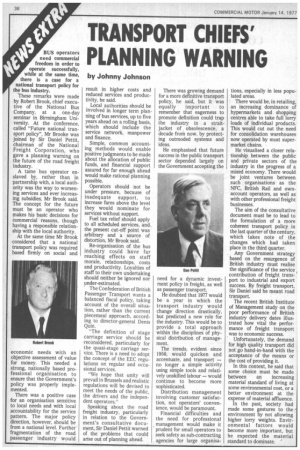TRANSPORT CHIEFS' PLANNING WARNING
Page 38

If you've noticed an error in this article please click here to report it so we can fix it.
by Johnny Johnson
BUS operators need commercial freedom in order to operate successfully, while at the same time, there is a case for a national transport policy for the bus industry.
These remarks were made by Robert Brook, chief executive of the National Bus Company, at a one-day seminar in Birmingham University. At the conference, called "Future national transport policy", Mr Brooke was joined by Sir Daniel Pettit, chairman of the National Freight Corporation, who gave a planning warning on the future of the road freight industry.
A tame bus operator enslaved by, rather than in partnership with, a local authority was the way to worsening services and ever increasing subsidies, Mr Brook said. The concept for the future must be an operator who makes his basic decisions for commercial reasons, though having a responsible relationship with the local authority.
At the same time Mr Brook • considered that a national transport policy was required based firmly on social and economic needs with an objective assessment of value for money. This needed a strong, nationally based professional organisation to ensure that the Government's policy was properly implemented.
There was a positive case for an organisation sensitive to local needs and with local accountability for the service pattern. The major policy direction, however, should be from a national level. Further' fragmentation of the road passenger industry would result in higher costs and reduced services and productivity, he said.
Local authorities should be involved in longer term planning of bus services, up to five years ahead on a rolling basis, which should include the service network, manpower and finance.
Simple, common accounting methods would enable positive judgments to be made about the allocation of public funds, and financial support assured for far enough ahead would make rational planning possible.
Operators should not be under pressure, because of inadequate support, to increase fares above the level they would nominate for services without support.
Fuel tax relief should apply to all scheduled services, and„ the present cut-off point was arbitrary and a source of distortion, Mr Brook said.
Re-organisation of the bus industry could have far reaching effects on staff morale, relationships, costs and productivity. Loyalties of staff to their own undertaking should neither be ignored nor under-estimated.
The Confederation of British Passenger Transport wants a balanced fiscal policy, taking account of the overall situation, rather than the current piecemeal approach, according to director-general Denis Quin.
"The definition of stage carriage service should be reconsidered, particularly for the quasi-stage carriage service. There is a need to adopt the concept of the EEC regulations on regular and occasional services.
"We hope that unity will prevail in Brussels and realistic regulations will be devised to meet the needs of the public, the drivers and the independent operators."
Speaking about the road freight industry, particularly in relation to the Government's consultative document, Sir Daniel Pettit warned of the problems that could arise out of planning ahead. There was growing demand for a more definitive transport policy, he said, but it was equally important to remember that eagerness to promote definition could trap the industry in a straitjacket of obsolescence, a decade from now, by protecting outmoded systems and ideas.
He emphasised that future success in the public transport sector depended largely on the Government accepting the need for a dynamic investment policy in freight, as well as passenger transport.
He doubted that 1977 would be a year in which the transport industry would change direction drastically, but predicted a new role for the industry. This would be to provide a total approach within the disciplines of physical distribution of management.
The trends, evident since 1950, would quicken and accentuate, and transport no longer a simple activity using simple tools and relatively unskilled labour — would continue to become more sophisticated.
Distribution management involving customer satisfaction, not operators' convenience, would be paramount.
Financial difficulties and the need for professional management would make it prudent for small operators to seek safety as sub-contracting agencies for large organisa tions, especially in less populated areas.
There would be, in retailing, an increasing dominance of hypermarkets and shopping centres able to take full lorry loads of individual products. This would cut out the need for consolidation warehouses now operated by most supermarket chains.
He visualised a closer relationship between the public and private sectors of the industry in the progress of a mixed economy. There would be joint ventures between such organisations as the NFC, British Rail and ownaccount operators, as well as with other professional freight businesses.
The aim of the consultative document must be to lead to the formulation of a more coherent transport policy in the last quarter of the century, which takes note of the changes which had taken place in the third quarter.
Any Government strategy based on the resurgence of British industry must realise the significance of the service contribution of freight transport to industrial and export success. By freight transport, Sir Daniel said he meant road transport.
The recent British Institute of Management study on the poor performance of British industry delivery dates illustrated how vital the performance of freight transport was to economic success.
Unfortunately, the demand for high quality transport did not go hand-in-hand with the acceptance of the means or the cost of providing it.
In this context, he said that some choice must be made between an increasing material standard of living at some environmental cost, or a better environment at the expense of material affluence.
In the past, society had made some gestures to the environment by not allowing higher lorry weights. Environmental factors would become more important, but he expected the material standard to dominate. '








































































































